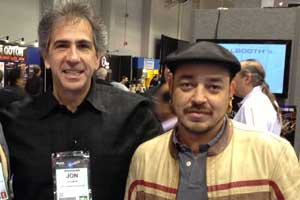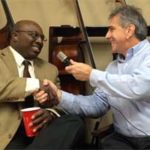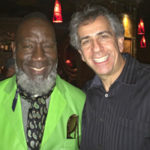Chicago bassist also reveals the full story behind his name
By David Sands
July 1, 2015
Make no mistake about it, Jauqo III-X marches to the sound of his own bass guitar.
He’s an artist who’s devoted his life to manifesting his own personal vision. Given this inclination, it’s not surprising people often remember the Chicago-based bass player, lyricist and producer for his innovations. Jauqo is credited for originating and helping to design the world’s first 15-string fretless bass. He’s also brought the low C# string to the bass guitar, something he used to maximum effect on his album Low C# Theory.
As for bands, he’s played in Mystical Entity and The Jauqo III-X Unit and currently leads up The Jauqo III-X Reality, an avant-funk trio that also features guitarist Will McCraven and drummer Micah Joseph Clark. Over the years, Jauqo has also played with an impressive roster of artists that includes bop saxophonist Von Freeman, session drummer Bernard “Pretty” Purdie and the late free jazz luminary Ornette Coleman.
FBPO’s Jon Liebman recently had the pleasure of interviewing the maverick bassist on his philosophy, gear, friendship with Ornette Coleman and more.
So what did For Bass Players Only learn? Perhaps it’s best to start off with the story of his name.
Jauqo has been playing bass since the age of 16. His love of music grew from listening to his father’s jazz collection and his mother’s Motown tunes. As a teenager he felt a natural pull towards the bass, beginning a love affair with the instrument that’s grown into something of an obsession.
His embrace of the bass and long hair style during his younger years invited comparisons to Weather Report’s legendary bassist, Jaco Pastorius.
“These older musicians would say to me, hey man, you’re like this bass player named Jaco Pastorius,” he says. “I didn’t pay no attention until I was hearing it so much I was like: ‘I need to see who this dude is!'”
During this time, he was living a wild lifestyle, one that would eventually land him in prison for attempted murder in the eighties and nineties. Although his given name is a well-guarded secret, he adopted the name “Jauqo,” after Pastorius, to keep his real name under wraps on the streets. In order to keep his individuality intact, he changed the spelling. While Jauqo admires Pastorius, he doesn’t consider him an influence, as he’s cultivated his own style.
The “III-X” came during his time in prison, where he had a spiritual experience that caused him to renounce his reckless former ways. The “III” symbolizes Mind, Body and Soul, while the “X” represents infinite growth potential.
Keeping true to his own spark is integral to Jauqo III-X. Individuality guides his art and it’s something he works to instill in others through bass clinics and his instructional material.
“I’m not knocking anyone, but my thing has always been individuality,” he says. “That’s why I’ve been working with my trio, which is the avant-funk feel-ya-thing, very groove heavy, with some solo stuff here and there.”
Jauqo admires funk forefathers Louis Johnson and Larry Graham, but, as with Pastorius, he takes care not to sound like other bassists.
However, he does name six greats that really moved him in his younger days: free jazz virtuoso Jamaaldeen Tacuma; Motown’s James Jamerson; session great Chuck Rainey; jazz, fusion and funk all-star Ralphe Armstrong; Bernard Edwards of the disco-funk band Chic; and Doug Wimbish of Living Colour.
Free jazz multi-instrumentalist and composer Ornette Coleman, however, had a powerful impact on his life. Growing up, the bassist heard a Coleman tune on the radio and was spellbound.
“I don’t remember what song it was, but the tone and the melody stayed with me, and then I started seeking out more recordings of Ornette,” he says.
Jauqo saw Coleman as a kindred spirit and aspired to play music with him.
“He literally was to me what Charlie Parker was to Miles Davis,” he says.
The bassist finally got an opportunity to speak with Coleman after he played the Chicago Jazz Fest in September 1983. Jauqo and some friends went backstage, but he balked at his chance. The next day he learned a musician friend had gotten Coleman’s phone number; Jauqo got that number and reached out.
“So I call Ornette up in September of ‘83, and he was so cool,” he says. “We would talk for hours. He would call me. Sometimes I would call him. He was touring all over the world at the time, and he would tell me when he was coming back.”
They developed a friendship and, one day, Jauqo got an invite to come to New York. Though nervous, the bassist jumped at the opportunity. Coleman bought the ticket, and Jauqo showed up at the famous musician’s residence, a converted high school.
“It turned into him showing me a lot of concepts, and we would do duets. I would be playing bass, of course, and he would be playing sax, and we would be back-and-forth.”
They also compared notes on compositions, and the bassist had his mind blown learning Coleman could play bebop. They remained good friends. Coleman kept in touch during his time in prison and even played a role in getting him an early release.
“Ornette played a big part in me getting my time… That’s why I say my whole thing with Ornette is much deeper,” he says. “Musically, personally, he was just a beautiful person–especially to be flying me to New York… He didn’t have to do that.”
As a veteran musician, Jauqo is often asked about gear. His advice is to get hands-on feel for an instrument. That said, he does have his own preferences.
His main fretless bass is a six-string fretless Luthier Prat, which was just equipped with new Bartolini tech. He also has three sub-contra basses, two fretted and one fretless, which he used on Low C# Theory. All three have Bartolini cleanups and pickups. Jauqo has been using Bartolini for roughly twenty years, and continues to be impressed with them.
“To me, the Bartolini pickups, they have a thickness that really works, especially with their preamp. It really has a sound,” he says. “My six-string Dingwall, it has a Bartolini system in it and kills it—just has a sound that just fills the room.”
He also owns four and five-string Sire Marcus Miller Signature basses, which he says are “incredibly high-quality instruments” at an “incredibly affordable price.” Ashdown amps have been his go-to amps for about 18 years, and he’s stayed with them because of their great sound and versatility.
Sharing his thoughts on the future, Jauqo says he’d like to embark on a world tour, whether it be with his trio, a quartet or just as a journeying troubadour. As for collaborations, he enjoys playing with other musicians and doing studio work, but only as far as it doesn’t sway him from following his own path.
“I know what I’m here for. I’m here to be that individual,” he says. “And that’s what cats get when they come hear me play.”




This guy is one of the most humble, down to earth, dudes around. Technically proficient, can do ridiculous things on the bass in private, but on stage is laser focused on one thing: the groove. Will offer advice to anyone, loan equipment, even spend time talking shop with a beginning bass player. Never speaks ill of other players. Dedicated to moving the bass guitar FORWARD – just a one of a kind dude.
Side note: I suspect his name is why he generates such strong emotions from the bass community (you know, Jaco Pastorius’s name is held in such high regard, many consider it blasphemy to invoke it). Alas,its only a name.